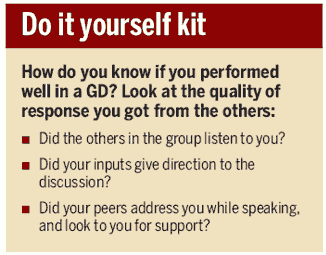
Once the written tests from B-schools such as CAT, MAT, XAT, etc, are done with, it's time to turn your attention to the next phase of the selection process -- the group discussion (popularly called the GD).
In several years of my association as a facilitator, moderator and judge for GDs, I have seen some perfectly good and capable students falter at this stage. While we can choose to blame the environment or even question the very validity of this tool, the fact remains that GDs are part of your life for the next few years at least and you need to be good at them to get into the institutes and organisations of your choice.
Let's make an attempt to demystify the GD from two perspectives: one, what do institutes look for in GDs, and two, how do you prepare yourself to improve your performance in GDs. We will also bust some myths that this animal has picked up over the years.
A typical GD comprises eight to 12 participants engaging in a discussion on an assigned topic or case study for a period of 10-20 minutes. You will be assessed on your performance, both as an individual and a team contributor. From an individual contributor's point of view, you have to excel in both content (the points you make during the GD), and form (the manner in which you present your views).
Team spirit
As an effective team player you would have a 'connect' with and acceptability by the other members of the group, you will listen to and understand others' points of view, contribute to the discussion with your own points and conduct yourself with grace in a group situation. Attributes like knowledge, analytical ability, assertiveness (but not aggression), clarity of thought and expression and decision-making ability play critical roles in enabling a superior performance in a GD.
So how does one prepare for GDs? Can one prepare at all? The answer is a thundering 'Yes'.
Charanpreet Singh is Associate Dean, Praxis Business School (Kolkata) and Director, Formal Education at IMS Learning Resources.

I would divide this task into three components:
Mastering the language
English will remain the medium of transaction throughout your working life -- so a level of comfort in English is critical not just for success in GD but also for career success. Address the four components of the 'practice' of English -- listen, read, speak and write.
Listen to people who speak well -- the objective is to get used to the 'sound' of good English.
Reading is, sadly, a vanishing pursuit in our country -- nothing can substitute the learning that reading affords. Develop a habit of reading -- this will further strengthen your relationship with the 'sound' of good English.
The only way to get better at speaking in English is to speak more of it -- especially in groups and formal situations. Make sure you speak 'correct' English even in informal gatherings. Remember, the practice of correct English is habit forming (and so, unfortunately, is the practice of bad English).
This habit should also extend to any writing that you may do -- an article, an essay or an e-mail. If you follow this four-fold path, slowly but surely your familiarity with and hence confidence in English will improve.

The quality of your content will depend on knowledge level, an attitude of enquiry and debate, and the ability to think on your feet. Be a well-informed person -- read newspapers and magazines and understand the dynamics of the industry, the society and the polity. Support your assertions with valid arguments and data wherever possible.
Most topics don't have easy answers -- you should attempt to bring in new perspectives to the discussion and not get sucked into this practice of just supporting or countering the topic or simply trying to prove others wrong. I call them passengers -- people who go through GDs with a combination of 'I agree with you' and 'I don't agree with you'. Good to know who you agree with -- but is that all you have to say?
Presentation, equally important
Form comprises structure, word selection and delivery -- learn to structure your inputs in a manner that makes it easy for others to understand you. Talk slowly, but like a bullet rather than a paragraph. Indians tend to talk too fast; we are also verbose. No wonder then that an audience, clearly keen to make its own mark, passes our comments by. Also, use 'soft' words when you are countering someone's point of view a polite suggestion is much more effective than a rude rejoinder.
Use phrases like 'we could' rather than 'we should' for example, 'we could look at some other aspects of the topic' is a suggestion -- it would get you a ready audience; 'we should look at some other aspects of the topic' is prescriptive and the natural reaction will be -- who are you to tell us what we should do? Words like 'concern' go down much better with the group than words like 'problem'. 'I feel we are digressing' has a whole different flavour than 'I feel you are digressing' -- the first is an admission, the second an accusation. These small things make a huge difference to your acceptability within the group and hence your performance. Your work at improving your English should pay off here -- enabling you to use the right words.
Listening, a must
Behaviour in a group spans concepts like giving space to others, listening to them, learning not to interrupt abruptly, treating peers with respect, appreciating opposing points of view -- at the same time remaining competitive. Learn to listen attentively, and learn to live with differences -- the whole beauty of a discussion is that people think differently and there are no clear rights and wrongs. How does -- 'I have another perspective on this' sound instead of the usual 'you are wrong?'.
So how do you know if you performed well in a GD? The best measure is the quality of response you get from the rest of the group -- did the other members listen to you when you spoke -- did your inputs give a new direction to the discussion -- did some of your peers address you while speaking and look for your support? If the answer to some of these questions is 'Yes', you did a good job. This also explains the real reason behind the universal crib -- 'I contributed good points but no one listened to me'. If the points were really good and presented well, people would have definitely listened. So, as is the case in most things in life, you yourself are in charge of your destiny.
Work on your English, increase your levels of knowledge and awareness, assess and improve your group behaviour. You will start looking forward to participating in GDs.